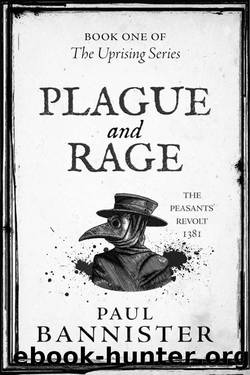Plague and Rage (The Uprising Series Book 1) by Paul Bannister

Author:Paul Bannister [Bannister, Paul]
Language: eng
Format: epub
Publisher: Lume Books
Published: 2023-02-16T00:00:00+00:00
Chapter 17
Wool
The booty we Thatcher cousins had taken in France was greatly valuable in an England drained of wealth and shockingly emptied of population. We found that people wanted coin so they could independently move elsewhere, and we could buy good properties, excellent beasts and good land for what was little more than a peppercorn. Joseph, Henry and I were joined by Jude, who came back from the siege of Calais as a tough, hardened longbowman. Edgar, victim of a Genoese arbalesterâs bolt, never returned and his scold of a wife had succumbed to the pestilence that devastated her village: just like hundreds of other villages which, if we could believe travellersâ tales, were uninhabited, deserted and crumbling.
Joseph, as eldest, held our joint booty of coin, some small amount of jewellery and a sack full of chopped-up silver and gold that had once been church plate looted from places of worship across a swathe of France. He had exchanged the bishopâs ransom note for coin at one of the Inns of Temple before the worst of the pestilence scoured London. âWe have gold and silver that the fat churchmen extorted from the faithful; they didnât deserve it anyway,â he told us as we met to make plans. âRemember, there is no one person to say we are villeins anymore. Our manorial lords are dead, the parish priests who may have had records have gone, too, and there is no sheriff or serjeant who knows us or can say we have feudal duties any longer.â
So, we faced the question of what to do. None of us wanted to continue soldiering, and we certainly no longer wished to be tied to a few strips of furrowed land. Joseph had a suggestion. âEnglandâs wealth comes from wool,â he asserted. âWe used to send raw wool to Flanders to be made into cloth; then it was our own abbeys that took the wool, under long contracts that favoured them, only to ship it to Flanders themselves. In the last short while, refugees who fled the mortality in the Low Countries came to Essex and Kent. I met one who said he used to make cloth in Bruges. Why do we not use our money to raise sheep, build a mill, and make the cloth ourselves? Tending a herd of sheep calls for much less labour than ploughing and reaping crops â just a few men are needed to tend a flock and wool is much more profitable than growing beans or onions. And, we have the grasslands of Kent and eastern England to feed the long-wooled flocks.â
Jude looked hesitant. âWhat do we know about spinning and weaving?â he asked plaintively.
Joseph nodded. âWe donât know much, but we will be able to sell our product, and weâll have money to hire those who do,â he said. âGetting the wool is fairly simple. You shear the sheep and separate the wool into grades for spinning. The coarser fibres make worsted yarn, the softer, inner layers make woollen yarn.
Download
This site does not store any files on its server. We only index and link to content provided by other sites. Please contact the content providers to delete copyright contents if any and email us, we'll remove relevant links or contents immediately.
The Spy by Paulo Coelho(1617)
The Covenant of Water by Abraham Verghese(1599)
Cain by Jose Saramago(1531)
La Catedral del Mar by Ildefonso Falcones(1163)
The Prince: Jonathan by Francine Rivers(1151)
Bridge to Haven by Francine Rivers(1145)
The August Few Book One: Amygdala by Sam Fennah(1114)
La Catedral del Mar by ILDEFONSO FALCONES(1072)
La dama azul by Sierra Javier(1052)
Cain by Saramago José(1047)
La dama azul(v.1) by Javier Sierra(1035)
A Proper Pursuit by Lynn Austin(1027)
Quo Vadis: A Narrative of the Time of Nero (World Classics) by Henryk Sienkiewicz(1022)
Devil Water by Anya Seton(1003)
Sons of Encouragement by Francine Rivers(977)
The Sacrifice by Beverly Lewis(973)
The Book of Saladin by Tariq Ali(963)
Murder by Vote by Rose Pascoe(944)
Creacion by Gore Vidal(926)
